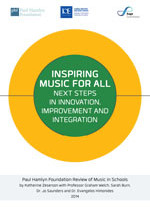Areas for Further Investigation
The establishment of the Expert Commission could be allied to further investigations. The speed of this review has meant that some areas of nuanced detail have had to be smoothed over, and important aspects of provision beyond schools have been only tangentially considered. In particular, the reviewers and contributors to the review felt that the following areas would benefit from detailed exploration, alongside those nominated for the focus of the Expert Commission:
Early years music making and progression into KS1 – there is some evidence of very good practice in this field as well as the usual patchy spread, and a general consensus that getting it right at Foundation stage makes a huge difference to children’s musical engagement and progress.
Improving links between formal and non-formal, or curricular and extra-curricular provision – the work on aligning the National Curriculum with the NPME will help with this, but there is a great deal to learn from the considerable range of emerging innovative practice, particularly in the area of work with young people in challenging circumstances.
Partnerships between schools and music organisations – there is also much to be learned from the variety of partnerships emerging between schools and music organisations, drawing out exemplary practice and producing guidelines for replication.
Parental attitudes and engagement – this hardly arose in the course of the review, and it is likely to become a more and more important factor in young people’s consistent access to musical experiences as subsidy is decentralised and reduced.
The impact of changing education structures – are there useful innovations to be found in academies and free schools? How do we ensure that all children receive nine years of high quality music provision in school if more and more schools are operating outside the statutory requirements?
